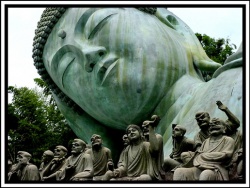Difference between revisions of "Bamboo Grove Monastery"
(Redirected page to Jetavana) |
|||
| Line 1: | Line 1: | ||
| − | + | [[File:Japanese bud.jpg|thumb|250px|]] | |
| + | <poem> | ||
| + | [[Bamboo Grove Monastery]] | ||
| + | [[竹林精舎]] (Skt [[Venuvana-vihara]]; Jpn [[Chikurin-shoja]]) | ||
| + | |||
| + | Also known as [[Venuvana Monastery]]. A [[monastery]] situated in the northern part of [[Rajagriha]] in [[Magadha]], [[India]]. It was built by [[King]] [[Bimbisara]] as an [[offering]] to [[Shakyamuni Buddha]]. According to one account, it was [[Kalandaka]], a wealthy man in [[Rajagriha]], who built the [[monastery]] and donated it to the [[Buddha]]. According to another account, [[Kalandaka]] [[offered]] his [[bamboo grove]], and [[Bimbisara]] built a [[monastery]] there. [[Bamboo Grove Monastery]] and [[Jetavana Monastery]] in [[Shravastiwere]] the two major centers of [[Shakyamuni's]] [[propagation]] [[activities]]. The {{Wiki|Chinese}}, [[Japanese]], and {{Wiki|English}} names are all literal {{Wiki|translations}} of the [[Sanskrit]], [[Venuvana-vihara]]: [[venu]] and [[vana]] mean [[bamboo]] and [[grove]], respectively, and [[vihara]] means [[monastery]]. | ||
| + | </poem> | ||
| + | {{R}} | ||
| + | [http://www.sgilibrary.org/search_dict.php?id=133 www.sgilibrary.org] | ||
| + | [[Category:India]] | ||
Latest revision as of 10:04, 5 October 2013
Bamboo Grove Monastery
竹林精舎 (Skt Venuvana-vihara; Jpn Chikurin-shoja)
Also known as Venuvana Monastery. A monastery situated in the northern part of Rajagriha in Magadha, India. It was built by King Bimbisara as an offering to Shakyamuni Buddha. According to one account, it was Kalandaka, a wealthy man in Rajagriha, who built the monastery and donated it to the Buddha. According to another account, Kalandaka offered his bamboo grove, and Bimbisara built a monastery there. Bamboo Grove Monastery and Jetavana Monastery in Shravastiwere the two major centers of Shakyamuni's propagation activities. The Chinese, Japanese, and English names are all literal translations of the Sanskrit, Venuvana-vihara: venu and vana mean bamboo and grove, respectively, and vihara means monastery.
